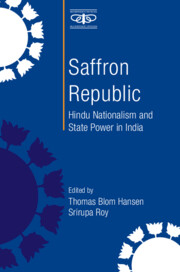1 - What Is New about ‘New Hindutva’?
Published online by Cambridge University Press: 31 May 2022
Summary
This collection of essays examines the phenomenon of contemporary Hindu nationalism or ‘New Hindutva’ in India, the ideology that orients the popularly elected national government of the Bharatiya Janata Party (BJP, Indian People's Party) that has been in power since 2014. There is a rich body of academic work on Hindu nationalism, but its main focus is on the insurgent mass mobilizations that roiled the country in the 1980s and 1990s. In contrast to this era of mandir (temple) politics, new Hindutva is a governmental formation with considerable institutional heft that converges with wider global currents and enjoys an unprecedented level of mainstream acceptance.
Contemporary Hindu nationalist politics is also significantly different from earlier versions in both form and substance. For instance, economic and foreign policy projects and aspirations are as important to Hindu nationalists today as are their efforts to shape and transform cultural and religious identity along Hindu majoritarian lines. Expanding beyond the regional arena of north Indian Hindi heartland politics, regions in the south, east, and northeast of the country have emerged as central theatres of Hindutva political action. The politics of caste has assumed a new and intense significance for Hindu nationalist mobilization and electioneering. Finally, cellular and individualized forms of vigilante action have emerged alongside older cadre-based, centralized, and mass organizational forms to advance the violent politics of Hindutva in the twenty-first century.
To understand these new political forms and their implications for democratic futures, a fresh set of reflections is in order. The essays in this volume address contemporary Hindutva as an example of a democratic authoritarianism or an authoritarian populism, that is, a politics that simultaneously advances and violates ideas and practices of popular and constitutional democracy. The democratic context of Hindutva as an electorally acclaimed and now apparently mainstream political project is our key concern. What are the causes and consequences of the rise of Hindutva, and of avowedly non-democratic Hindu nationalist organizations like the Rashtriya Swayamsevak Sangh (RSS, National Volunteer Organization), in an intensely competitive electoral democracy?
Understanding Hindu Nationalism
The 1990s saw a surge of scholarly interest in the rise of Hindu nationalism. Reflecting the socio-political and academic zeitgeist, these interventions shared several common features.
- Type
- Chapter
- Information
- Saffron RepublicHindu Nationalism and State Power in India, pp. 1 - 24Publisher: Cambridge University PressPrint publication year: 2022



